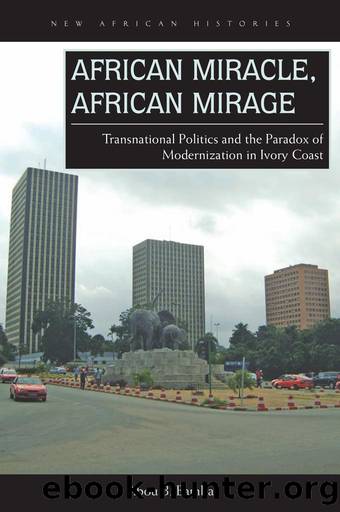African Miracle by Abou B. Bamba

Author:Abou B. Bamba [Abou B. Bamba]
Language: eng
Format: epub
THE COURSE OF THE IVORIAN economic growth was not without its problems. This emerged clearly in the rush to turn the savanna region into a model of state-led development. In addition to its heavy reliance on foreign capital and expertise, the expansion of the agribusiness of sugar production was largely seen as a top-down technopolitical exercise, which theoretically de-democratized the search for the good life. Such an elitist vision not only marred the implementation of the sugar program, it also weakened other state-driven modernization schemes, including the twin regional development projects of Kossou and San Pedro.
The current chapter looks at the shortcomings of the Ivorian economic growth that cast a dark shadow on the achievements of the miracle. Student activists, Marxist Africanists, Left-leaning Ivorian academics, and local organic intellectuals articulated some of the earlier critiques of these weaknesses. In fact, even as many foreign observers hailed Ivory Coast as a model to be emulated, radical thinkers never stopped underlining the limitations of its strategies of development and nation building. Their criticisms, which were echoed in rallies, novels, political tracts, rumors, lectures, and in other popular outlets, formed both an alternative discourse on the Thirty Glorious Years and a social reality that the Ivorian authorities, by necessity, had to engage lest they sow the seeds of popular unrest.
The chapter also explores the contours of the response of the Ivorian government, including the launching of the state-led educational television project that began in the early 1970s as the authorities sought to expand the provision of primary school education to a growing number of children. Although meant to respond to the pressing calls for more Africanization of the labor force, the project would ultimately entrench French hegemony in Ivory Coast. Other government-initiated development actions in the late 1970s, such as the construction of a second dam on the Bandama, would leave in their wake devastating social and ecological consequences and would worsen the already difficult conjuncture of the burden of foreign debt and the incidence of its service.
The story of the last boom years of the Ivorian economy demonstrates that the expensive state-initiated schemes created some of the conditions leading to the adoption of a series of structural-adjustment programs in the 1980s. In so doing, it validated the criticisms of those who claimed that the Ivorian miracle was just a mirage whose holdâsooner or laterâwas bound to dissipate.
Download
This site does not store any files on its server. We only index and link to content provided by other sites. Please contact the content providers to delete copyright contents if any and email us, we'll remove relevant links or contents immediately.
Zero to IPO: Over $1 Trillion of Actionable Advice from the World's Most Successful Entrepreneurs by Frederic Kerrest(4571)
Machine Learning at Scale with H2O by Gregory Keys | David Whiting(4313)
Never by Ken Follett(3957)
Harry Potter and the Goblet Of Fire by J.K. Rowling(3857)
Ogilvy on Advertising by David Ogilvy(3622)
Shadow of Night by Deborah Harkness(3368)
The Man Who Died Twice by Richard Osman(3080)
Book of Life by Deborah Harkness(2939)
The Tipping Point by Malcolm Gladwell(2923)
Will by Will Smith(2920)
Purple Hibiscus by Chimamanda Ngozi Adichie(2855)
0041152001443424520 .pdf by Unknown(2846)
My Brilliant Friend by Elena Ferrante(2831)
How Proust Can Change Your Life by Alain De Botton(2814)
How to Pay Zero Taxes, 2018 by Jeff A. Schnepper(2655)
Hooked: A Dark, Contemporary Romance (Never After Series) by Emily McIntire(2555)
Rationality by Steven Pinker(2365)
Can't Hurt Me: Master Your Mind and Defy the Odds - Clean Edition by David Goggins(2341)
Borders by unknow(2315)
